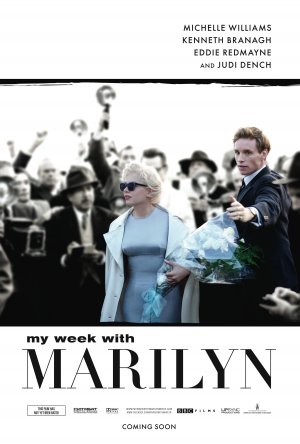
My Week With Marilyn Lacks New Knowledge On Its Star
Written by: Daron Taylor, Special to CC2K
 My Week with Marilyn is based on the memoir of Colin Clark (Eddie Redmayne), a young starry-eyed Brit who, through his fortunate connection to Sir Laurence Olivier (Kenneth Branagh) and his own determination to be part of the movie biz in any capacity, gets a job as a gopher on the set of The Prince and the Showgirl. During the course of production Clark cozies up to the cast including Dame Sybil Thorndike (Judi Dench), Sir Laurence Olivier, and to his infinite pleasure Marilyn herself (Michelle Williams). Not to mention buttoned-up, long-skirted costume shop worker Lucy (Emma Watson, giving her the Hermione treatment), who ends up being Clark’s second thought, and who can blame him? When Monroe’s husband, the playwright Arthur Miller, leaves the country for a week, Monroe turns to Clark as a companion, guide, plaything, and shield against her entourage.
My Week with Marilyn is based on the memoir of Colin Clark (Eddie Redmayne), a young starry-eyed Brit who, through his fortunate connection to Sir Laurence Olivier (Kenneth Branagh) and his own determination to be part of the movie biz in any capacity, gets a job as a gopher on the set of The Prince and the Showgirl. During the course of production Clark cozies up to the cast including Dame Sybil Thorndike (Judi Dench), Sir Laurence Olivier, and to his infinite pleasure Marilyn herself (Michelle Williams). Not to mention buttoned-up, long-skirted costume shop worker Lucy (Emma Watson, giving her the Hermione treatment), who ends up being Clark’s second thought, and who can blame him? When Monroe’s husband, the playwright Arthur Miller, leaves the country for a week, Monroe turns to Clark as a companion, guide, plaything, and shield against her entourage.
How much of Clark’s memoir can actually be believed is up for debate. To me a larger part of the story felt straight out of the plot of a “Mary-Sue” Internet fan-fiction. There were moments during the movie when quite a few men in the audience made that “whoa-OH!” laugh as Clark literally acted out one of the predominant male fantasies of the past fifty years. It may be a fantasy, but it is a thoroughly enjoyable one. I predict scores of men will fall in love with Marilyn all over again after seeing this movie. Or at least in love with Michelle William’s version of her.
Williams does a truly magnificent job of capturing Marilyn’s mannerisms and speech pattern, and sparks that “certain indefinable magic” as Billy Wilder put it. And will likely (and deservedly) be rewarded for it come awards season. I have to admit the first time I saw Williams onscreen as Marilyn, what struck me more than anything else was the padding she had to add to achieve something close to Marilyn’s legendary hourglass. Eventually my eyes adjusted, but I couldn’t help but wonder what it says about the evolution of our aesthetic sense when the actress playing such an iconic figure has to pad her own.
The movie on the whole was simplistic, predictable and somewhat heavy-handed in it’s narration. My head hurt after being knocked over by “young Clark’s heart will be broken! But he will learn” too many times. It’s Kenneth Branagh who saves this movie from Clark’s adolescent yearnings and gives it its light heart. His Olivier is a moody, aging transplant from the stage who despises Marilyn’s method and the pandering of her coach, Paula Strasburg (Zoe Wanamaker), even more. He is constantly raging in an endearing, eye-rolling way, possibly like your grandpa or conservative uncle. In one of my favorite scenes he becomes exasperated after having put up with Marilyn’s lateness and her insecurities, imploring her to stop trying so hard and just “be sexy”. The cast is shocked, the audience gasps and Marilyn leaves in a huff. Laurence, didn’t you know that to acknowledge your own sexiness is to risk crossing over into slut territory, a la Britney?
As someone who grew up in Los Angeles, it’s impossible to escape the shadow of the Hollywood sign. I’ve seen too much Marilyn Monroe memorabilia to count and I’ve been to her grave. In some way I was hoping this movie would rescue Marilyn from the cheap and gaudy. That it would reclaim Marilyn from those ladies who dress up in white dresses for tips in front of Grauman’s Chinese. And while the movie does give a few nods to Marilyn’s troubled childhood and focuses quite heavily on her drug dependency, there is little more here than we might find in a late night TV biography. But it turns out the movie isn’t really about Marilyn. It’s about Colin Clark, or really anyone who’s fallen in love with the movies.
I left wishing director Simon Curtis had snuck in some of Marilyn’s original performances instead of Williams’ at the beginning and end of the film. Certainly Curtis chose to have Williams perform these musical numbers in order to keep her from being overshadowed by Marilyn’s charisma, or to avoid audience nit-picking. I only wish he had shown us some of Marilyn’s work to remind us of what an incredible performer she really was and why we continue to be fascinated by her.
